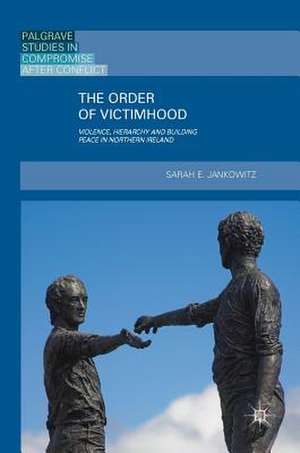The Order of Victimhood: Violence, Hierarchy and Building Peace in Northern Ireland: Palgrave Studies in Compromise after Conflict
Autor Sarah E. Jankowitzen Limba Engleză Hardback – 12 oct 2018
| Toate formatele și edițiile | Preț | Express |
|---|---|---|
| Paperback (1) | 448.76 lei 6-8 săpt. | |
| Springer International Publishing – 19 ian 2019 | 448.76 lei 6-8 săpt. | |
| Hardback (1) | 527.79 lei 6-8 săpt. | |
| Springer International Publishing – 12 oct 2018 | 527.79 lei 6-8 săpt. |
Din seria Palgrave Studies in Compromise after Conflict
- 18%
 Preț: 727.80 lei
Preț: 727.80 lei -
 Preț: 332.14 lei
Preț: 332.14 lei -
 Preț: 380.63 lei
Preț: 380.63 lei -
 Preț: 387.75 lei
Preț: 387.75 lei - 15%
 Preț: 642.03 lei
Preț: 642.03 lei -
 Preț: 387.20 lei
Preț: 387.20 lei - 15%
 Preț: 640.06 lei
Preț: 640.06 lei - 18%
 Preț: 953.20 lei
Preț: 953.20 lei - 18%
 Preț: 783.50 lei
Preț: 783.50 lei - 18%
 Preț: 730.35 lei
Preț: 730.35 lei - 18%
 Preț: 730.65 lei
Preț: 730.65 lei - 18%
 Preț: 789.83 lei
Preț: 789.83 lei - 15%
 Preț: 591.79 lei
Preț: 591.79 lei - 15%
 Preț: 697.15 lei
Preț: 697.15 lei - 15%
 Preț: 528.13 lei
Preț: 528.13 lei - 15%
 Preț: 582.63 lei
Preț: 582.63 lei - 5%
 Preț: 1286.08 lei
Preț: 1286.08 lei - 15%
 Preț: 636.63 lei
Preț: 636.63 lei - 18%
 Preț: 783.50 lei
Preț: 783.50 lei - 15%
 Preț: 640.06 lei
Preț: 640.06 lei - 18%
 Preț: 725.61 lei
Preț: 725.61 lei -
 Preț: 319.81 lei
Preț: 319.81 lei - 15%
 Preț: 640.06 lei
Preț: 640.06 lei
Preț: 527.79 lei
Preț vechi: 620.94 lei
-15% Nou
Puncte Express: 792
Preț estimativ în valută:
100.99€ • 105.44$ • 83.58£
100.99€ • 105.44$ • 83.58£
Carte tipărită la comandă
Livrare economică 04-18 aprilie
Preluare comenzi: 021 569.72.76
Specificații
ISBN-13: 9783319983271
ISBN-10: 331998327X
Pagini: 230
Ilustrații: XII, 218 p.
Dimensiuni: 148 x 210 x 15 mm
Greutate: 0.43 kg
Ediția:1st ed. 2018
Editura: Springer International Publishing
Colecția Palgrave Macmillan
Seria Palgrave Studies in Compromise after Conflict
Locul publicării:Cham, Switzerland
ISBN-10: 331998327X
Pagini: 230
Ilustrații: XII, 218 p.
Dimensiuni: 148 x 210 x 15 mm
Greutate: 0.43 kg
Ediția:1st ed. 2018
Editura: Springer International Publishing
Colecția Palgrave Macmillan
Seria Palgrave Studies in Compromise after Conflict
Locul publicării:Cham, Switzerland
Cuprins
1. Introduction: Victimhood, Violence and Northern Ireland.- 2. Dealing with the Past.- 3. The Social Construction of Victimhood and Complex Victims.- 4. The Victim-Perpetrator Paradigm.- 5. Hierarchies of Victims.- 6. Hierarchies, Division and Exclusion.- 7. Conclusion: Towards Thicker Reconciliation.
Notă biografică
Sarah E. Jankowitz is Research Associate at the Institute of Irish Studies, University of Liverpool, and former Research Associate in the Department of Urban Studies and Planning, University of Sheffield. She completed her Doctorate at Trinity College Dublin and spent several years participating in grassroots peacebuilding initiatives in Northern Ireland.
Textul de pe ultima copertă
This book explores how the construction and contestation of victims in societies emerging from conflict impact processes of peacebuilding. It locates its inquiry in Northern Ireland where highly politicized, unresolved narratives of violence and a so-called ‘hierarchy of victims’ illuminate inherent paradoxes of victimhood in intergroup conflict. The author critiques how mechanisms designed to address the legacy of conflict often reify exclusive ‘victim’ and ‘perpetrator’ identities and obscure complex harm. Adopting an interdisciplinary lens, the book examines how the image of the ideal victim interacts with intergroup processes in a polarizing and intractable victim-perpetrator paradigm. The analysis of these issues in Northern Ireland suggests that exclusive policies and mechanisms reinforce rather than repair societal divisions, and that inclusive, complex approaches to victimhood are necessary to build sustainable peace. This book will be of particular interest to scholars of peace studies, transitional justice and criminology.
Caracteristici
Offers a deep, sociological analysis of victimhood, identities and relationships relating to transitional justice and reconciliation Critically examines hierarchies of victimhood and identifies a fourfold typology Discusses the key events that have influenced the debate on victims and transition in Northern Ireland over the past 15 years of the peace process
